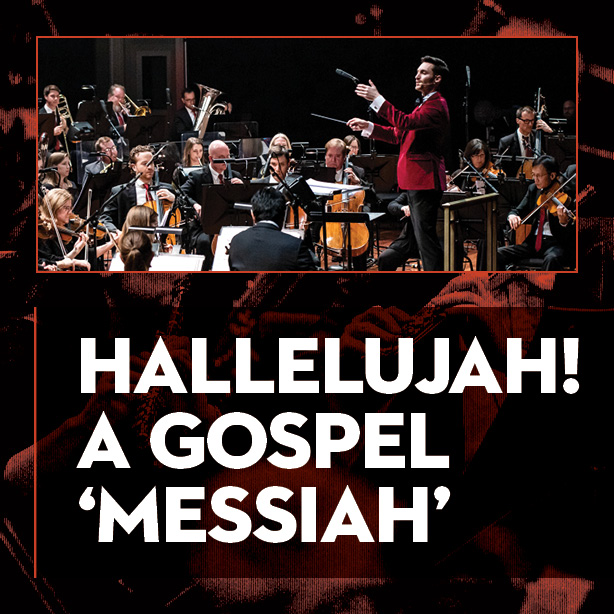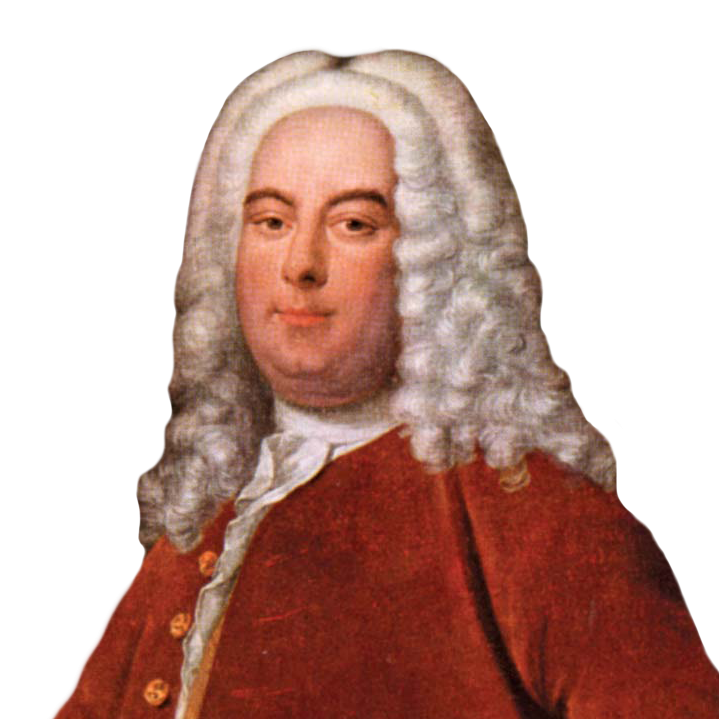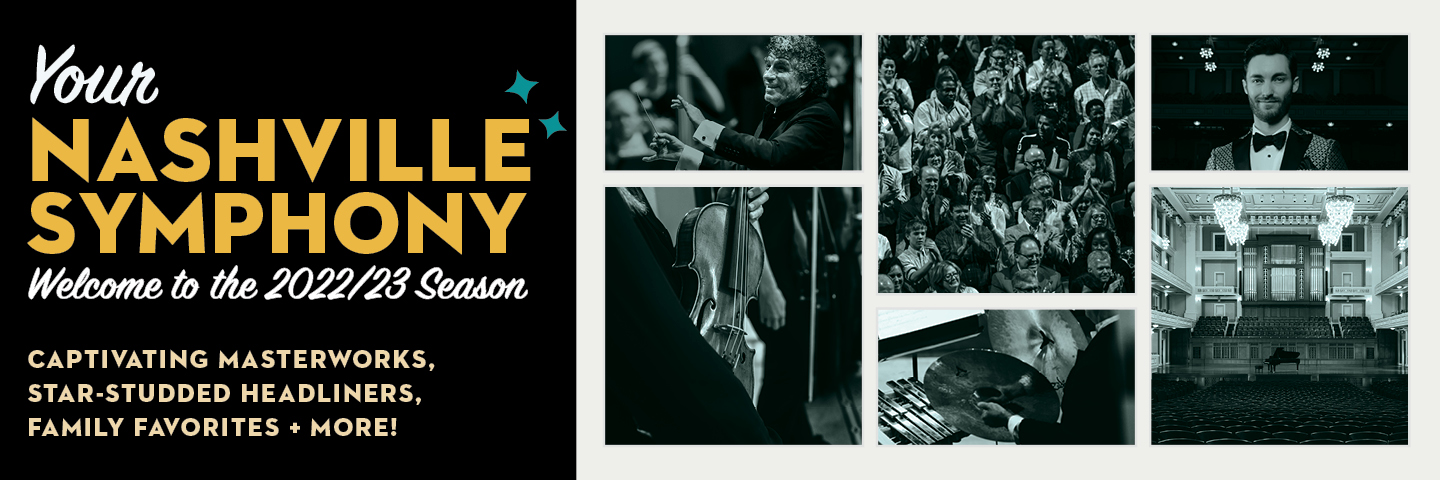
 |
|
|
|
|
|
Estimated length: |
|
|
|
|
|
|
|
First Nashville Symphony performance: December 15, 1963, with Music Director |
|
Although he became known as George Frideric Handel after settling in London in 1712, the composer Georg Friedrich Händel grew up in Halle in present-day central Germany (just a couple hours’ drive from Johann Sebastian Bach’s birthplace in Eisenach), the son of a barber-surgeon. But he adopted England as his home. Handel attracted admiring royal and aristocratic patrons but also enjoyed success as a musical entrepreneur, managing the production of a prolific series of Italian operas he wrote for the London stage.
His reputation and fortune soared, but fashions changed, and Handel was compelled to reinvent himself by shifting his focus to the English oratorio — essentially, opera in disguise, without the costumes. Even though he still had a few more operatic projects up his sleeve, by the time he composed Messiah in 1741, Handel had ceased writing Italian operas altogether. He continued to compose oratorios through the next decade until blindness overtook him.
Messiah thus belongs to a pivotal turning point in Handel’s career, when he was shifting his focus away from the genre of tragic opera that had initially made him a sensation in London (with Rinaldo, in 1711). Handel’s Italian operas typically retold stories from mythology or history. A genre calculated to showcase the star singers of the era, it involved spectacular (and spectacularly expensive) special effects as part of the staging. By the late 1730s, the high costs of production were making opera an unsustainable business model, and the English public’s musical taste had changed.
In Handel’s English variation on the older oratorio format, a sense of moral uplift is juiced along by the entertainment value of opera, but without the expense, costumes — and fussy, overpaid egos. Messiah’s success over the ensuing centuries caused it to eclipse Handel’s other works of music drama and even gave it a reputation as the quintessential English oratorio.
Yet Handel and his librettist, Charles Jennens, took a risk by shaping Messiah as they did. In many ways, it swerves from the norm. Indeed, the oratorio initially touched off a controversy that raged for several years back in London, despite the acclaim Messiah received when it was first introduced to Dublin audiences at the conclusion of the 1741–42 season.
Messiah’s method of setting actual scriptural texts and its evocation of Jesus within a secular genre that could be performed “for diversion and amusement” even triggered charges of blasphemy, although these were leveled against the secular context of the presentation (at London’s Covent Garden) rather than Handel’s music itself. But when the composer led performances near the end of his life at a newly established charity in London, the Foundling Hospital, the success was so overwhelming that it helped secure Messiah's enduring reputation.
The earlier disapproval turned out to be a short-lived cultural skirmish. The tradition began of annual performances of Messiah which were associated with benevolent intentions, raising considerable sums for the charity. (In his will, Handel donated the original score to the Foundling Hospital.) These always took place in the spring, at Eastertide — just as we encounter in these Nashville Symphony and Chorus performances, which present a fuller rendition of the complete score. It was only after Handel’s death that the association of Messiah with the Christmas season became firmly embedded.
Handel also introduced changes at several of these revivals. For the most part, these involved substitutions or rewrites of arias. They reflected practical performance conditions and took into account the limitations or strengths of the particular soloists on hand. In fact, even the Dublin premiere varied somewhat from the score Handel had written out beforehand. For the revival of 1750, for example, since the castrato Gaetano Guadagni was available (he later created the role of Orfeo in Gluck’s famous opera), Handel recast the bass aria “But who may abide the day of his coming” to include a dizzyingly virtuosic setting of the phrase “a refiner’s fire.”
Charles Jennens had collaborated previously with Handel and likely compiled the book for Israel in Egypt (first presented in 1739), which anticipates the method of construction of Messiah, arranging actual texts from the bible. But the process is less straightforward in Messiah. Jennens — a wealthy patron who was nevertheless an outsider, disaffected with contemporary English politics — juxtaposes extracts from both the Old and the New Testaments to represent the basic narrative of Christian redemption. Rather than a biographical sketch of the life of Jesus, Messiah concerns the very idea of divinity becoming manifest in human history (hence the lack of the definite article — “the Messiah” — in its title).
There is very little dramatic impersonation of characters. The narrative is indirect and suggestive, and, as has been often noted, downright confusing to anyone not familiar with the implied events involving the life of Jesus. Jennens divides the libretto into three acts (although he calls them “parts”), much like the organization of a baroque opera. Part One centers around prophecy and the nativity of Jesus, ending with his miracles (this is the part of the oratorio that is most closely tied to the Christmas season). Following its evocation of hope comes a condensed version of the Passion story of sacrifice in Part Two. Part Three concludes with the implications of Christ’s redemption of humanity from the fall of Adam.
WHAT TO LISTEN FOR
Handel’s musical expression homes in on the universal emotions that underlie each stage of the Christian redemption narrative. Handel was above all a man of the theater, and his operatic genius for establishing the mood to suit a given situation is everywhere apparent. But in opera, Handel typically accomplishes this through a lengthy chain of arias. The centrality of the chorus in Messiah allows for greater diversity. Part One establishes a pattern of recitative, aria, and chorus, which then allows for further variation in the other two parts.
Handel moreover draws on the gamut of international styles of his era, mixing thrillingly complex Northern European counterpoint alongside straightforward, Italianate lyricism, majestic French rhythms, and homophonic choruses. He avails himself as well of an astonishing range of colors in the accompanying textures, though with a remarkable economy of instrumentation. Notice, for example, how the trumpets remain silent in Part One until “Glory to God,” and are subsequently kept in the wings until the “Hallelujah!” chorus at the end of Part Two. (Incidentally, the glory this chorus depicts refers not to the moment of Christ’s resurrection but to the triumph of redemption).
Consider, too, the compelling psychological range Handel explores, encompassing in Part One alone the fathomless darkness associated with the period of universal waiting for a savior; the oasis-like calm of the purely instrumental “Pastoral Symphony,” with its evocation of the music of shepherds; and the dancing exuberance of “Rejoice greatly, O Daughter of Zion.” Handel continually finds freshly inventive ways to “paint” the words through music (witness the “straying” lines of “All we like sheep”) but subtler surprises are often hidden within his settings as well. In that same chorus, Handel engineers a detour from the cheerful mood that predominates into the tragic minor when the consequences of human failure are suggested.
Amid all this variety, by the end of Part Three Handel has taken us on a journey that will later become familiar in the symphonies of Beethoven — the passage from darkness to enlightenment and final victory. The “Hallelujah!” chorus may seem unbeatable, yet somehow Handel manages to follow it with still more glorious music: the soaring certainty of “The trumpet shall sound” and the progression of the choral finale, with its fugal setting of “Amen.” As the voices weave their threads together, that final word becomes a serene chant, all-encompassing in its resonance.
In addition to four vocal soloists and four-part chorus, the version of Handel’s scoring for Messiah used in these performances call for an orchestra of 2 oboes, bassoon, 2 trumpets, timpani, strings, harpsichord and organ.
— Thomas May is the Nashville Symphony’s program annotator.
Tucket Biddlecombe, Chorus Director
|
|
|
|

